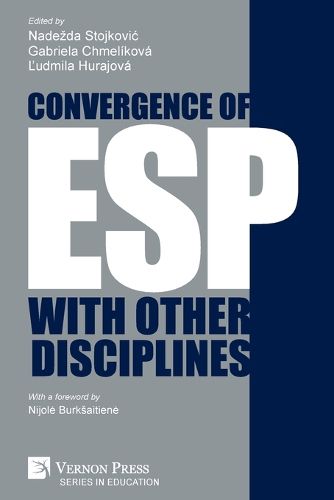Readings Newsletter
Become a Readings Member to make your shopping experience even easier.
Sign in or sign up for free!
You’re not far away from qualifying for FREE standard shipping within Australia
You’ve qualified for FREE standard shipping within Australia
The cart is loading…






This title is printed to order. This book may have been self-published. If so, we cannot guarantee the quality of the content. In the main most books will have gone through the editing process however some may not. We therefore suggest that you be aware of this before ordering this book. If in doubt check either the author or publisher’s details as we are unable to accept any returns unless they are faulty. Please contact us if you have any questions.
In designing a successful English for Specific Purposes (ESP) course, an ESP lecturer must research the professional setting and in turn analyze, abstract and synthesize its linguistic characteristics. Expert vocabulary, typical syntactic structures, relevant morphological word formation processes, exemplary text organization and both written and spoken stylistics are no longer taught with little functional relevance, instead they are approached from a subject-specific perspective. While designing and/ or compiling teaching and learning material, an ESP lecturer must decide upon the appropriate teaching methodology and pedagogy in order to ensure that the course in its entirety simulates a particular professional situation. Only if the course is successful in this aim, will ESP learners be able to quickly engage in uninhibited communication and improve job performance in their field of work, whether that be in tourism or aviation.
Although many professional settings share certain characteristics, they are nevertheless unique and often require different approaches. For this reason, there is little or no ready-made teaching material or methodological approaches when it comes to ESP teaching. A dedicated ESP lecturer caters for those idiosyncrasies doing a minute, multifaceted investigation into the linguistic characteristics of the relevant professional domain. Bringing together a collection of essays, this edited volume reveals the variety, depth, and quality of the ESP research and its convergence across different professional disciplines.
$9.00 standard shipping within Australia
FREE standard shipping within Australia for orders over $100.00
Express & International shipping calculated at checkout
This title is printed to order. This book may have been self-published. If so, we cannot guarantee the quality of the content. In the main most books will have gone through the editing process however some may not. We therefore suggest that you be aware of this before ordering this book. If in doubt check either the author or publisher’s details as we are unable to accept any returns unless they are faulty. Please contact us if you have any questions.
In designing a successful English for Specific Purposes (ESP) course, an ESP lecturer must research the professional setting and in turn analyze, abstract and synthesize its linguistic characteristics. Expert vocabulary, typical syntactic structures, relevant morphological word formation processes, exemplary text organization and both written and spoken stylistics are no longer taught with little functional relevance, instead they are approached from a subject-specific perspective. While designing and/ or compiling teaching and learning material, an ESP lecturer must decide upon the appropriate teaching methodology and pedagogy in order to ensure that the course in its entirety simulates a particular professional situation. Only if the course is successful in this aim, will ESP learners be able to quickly engage in uninhibited communication and improve job performance in their field of work, whether that be in tourism or aviation.
Although many professional settings share certain characteristics, they are nevertheless unique and often require different approaches. For this reason, there is little or no ready-made teaching material or methodological approaches when it comes to ESP teaching. A dedicated ESP lecturer caters for those idiosyncrasies doing a minute, multifaceted investigation into the linguistic characteristics of the relevant professional domain. Bringing together a collection of essays, this edited volume reveals the variety, depth, and quality of the ESP research and its convergence across different professional disciplines.